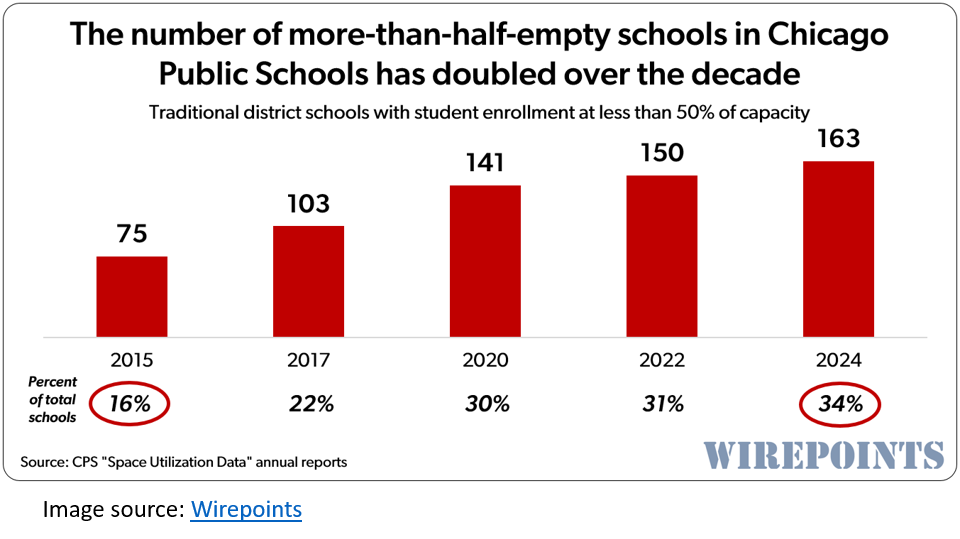Insanity Rules in Chicago Public Schools
Recent developments in the public-school district of Chicago could be described as a perfect storm; an extremely bad situation in which many bad things are converging at the same time. The circumstances might collectively serve as a glaring example of the abject failure of U.S. public education.
At the center of the debacle is the Chicago Teachers Union (CTU), the antics of which Education Reporter briefly reported in August as the union battled the city for a bloated $50 billion contract. Still in negotiations, one of the main sticking points is the union’s opposition to district efforts to close schools that are almost completely devoid of students.
Last month, the independent nonprofit company, Wirepoints, reported that the Chicago Public School system (CPS) “is in dire financial straits, yet [the] Chicago Teachers Union blocks closing of near-empty, failing schools.” At the time, then-CPS CEO Pedro Martinez was under heavy fire from the CTU for “reportedly developing a list of at least 100 schools that could be closed and/or consolidated due to low utilization rates.” Although Martinez denied that he wanted to close any schools, he and the entire school board has since resigned, clearing the way for an entirely new board that was just appointed by Chicago Mayor Brandon Johnson.
Johnson has repeatedly declined to admit he supported the removal of the CEO, but the Chicago Tribune reported that these resignations “stem from an ongoing campaign by Johnson to oust schools chief Martinez, one that is taking place amid stalled contract talks with the Chicago Teachers Union and has placed immense pressure on the seven-member school board to carry out the CTU-aligned mayor’s orders.”
 The Tribune further stated that the mayor’s opposition to Martinez was in part fueled by the CEO’s “refusal to take out a $300 million high interest loan as well as assume a $175 million pension payment for nonteacher CPS employees.” The board supported Martinez on those matters, despite the mayor’s insistence that the loan was needed when additional dollars were not forthcoming from the state.
The Tribune further stated that the mayor’s opposition to Martinez was in part fueled by the CEO’s “refusal to take out a $300 million high interest loan as well as assume a $175 million pension payment for nonteacher CPS employees.” The board supported Martinez on those matters, despite the mayor’s insistence that the loan was needed when additional dollars were not forthcoming from the state.
An op-ed in the Wall Street Journal called replacement of the board “The Chicago School Board Coup,” and characterized Martinez’s opposition to “exorbitant short-term borrowing” as a “display of sanity” for which the CPS CEO became “persona non grata at City Hall.”
The Center Square reported that, when asked about Mayor Johnson “possibly taking out a high-interest loan to fill CPS’ $500 million budget deficit”, [Illinois] Gov. J.B. Pritzker said: “Borrowing to pay for operating expenses in a business, in government, etc. is not a great idea, unless you know how you’re going to pay for that.” Pritzker claimed education is one of his highest priorities but noted, “there is only so much money the state can spend on Chicago Public Schools.”
The CPS allegedly spends $18,000 per pupil per year, but Wirepoints President Ted Dabrowski told the Daily Caller News Foundation that the total is more like $30,000, even though few students can read or do math at grade level. “The biggest problem is the system doesn’t work,” Dabrowski said.
Many parents and citizens appear to agree. A recent survey by the national nonpartisan research group, Public Agenda, showed that Chicago residents “think the biggest problem in the city’s public schools is that students are not learning enough academically,” and that “the system’s main goal should be to prepare students for college.”
The study also found that Chicagoans believe “politicians and educational leaders are focused on petty political battles instead of what is best for students,” and few believe the CPS budget is being effectively administered. It appears most parents and citizens are not buying the CTU propaganda, nor are they sympathetic to Mayor Johnson’s politically motivated machinations.
Union demands
In opposing Martinez, the CTU declared in a social media post quoted by the Daily Caller that the CEO is “a huge barrier to our collective success,” and calling for him to step down. The fact that Mayor Johnson failed to support Martinez despite his occasional attempts to inject sanity into management of the city’s schools is no surprise — the CTU backed Johnson for mayor over former mayor Lori Lightfoot in the last election cycle. In dismissing Martinez, CTU stated:
- We need someone who can steer CPS toward equity, growth, and opportunity — not back to the harmful decisions of the past. Our students and communities deserve a leader who will invest in the future of public education and prioritize Black and Brown neighborhoods, not leave them behind. We believe it’s time for CEO Martinez to step aside for someone who will seize this historic opportunity to transform our schools.
But such time-worn agitprop is viewed as a joke by many parents and observers. As Wirepoints reported, the real reason for the need to close schools is the 26 percent reduction in public school enrollment over two decades, “overwhelmingly driven by a 50 percent drop in black attendance — down by about 115,000.” Wirepoints found that declining enrollment “was a key factor that led to the closure of 50 Chicago schools back in 2013.” With enrollment continuing to shrink and the number of over half-empty schools doubling in 10 years, closures and consolidations just make sense. But the CTU disapproves because, says Wirepoints, “that would reduce its membership and its power.”
In an October 4 update posted on its website, Wirepoints warned that nothing transformational is likely to occur as a result of the current infighting between CPS and the CTU. “[T]he outcome won’t change what matters most,” they wrote, “that Chicago’s children can’t read.... Reading proficiency levels for graduating students remains stuck at near 10 percent.”
Chronic absenteeism
Another major problem cited by various news sources and impacting schools nationwide is absenteeism. Chronic absenteeism has been rampant in general since the pandemic, “but in Chicago it’s worse,” wrote senior vice president of the Illinois Policy Institute, Hilary Gowins, in an op-ed published last spring on the organization’s website. “That hurts students’ futures and the city’s wellbeing.”
Gowins’ editorial included a chart showing CPS leading the way in chronic absenteeism among the five largest school districts in the country. Both the Los Angeles Unified School District and the Miami-Dade County School District had nine percent less absenteeism than the CPS, with Clark County, Nevada and the New York City School District registering two percent and four percent less respectively.
 The Foundation for Economic Education (FEE) says the problem of absenteeism “isn’t the students, it’s the schools.” FEE reported in July about a coalition of strange bedfellows that was formed to address the issue, including the American Enterprise Institute, the left-leaning Education Trust, and Attendance Works, a nonprofit group focused on combatting absenteeism.
The Foundation for Economic Education (FEE) says the problem of absenteeism “isn’t the students, it’s the schools.” FEE reported in July about a coalition of strange bedfellows that was formed to address the issue, including the American Enterprise Institute, the left-leaning Education Trust, and Attendance Works, a nonprofit group focused on combatting absenteeism.
FEE reported that the coalition’s plan to cut absenteeism involves implementing “a variety of initiatives, including home visits and similar interventions,” with the goal of reducing absentee rates “to pre-pandemic levels, or around 13 percent, by 2029.”
FEE senior fellow and spokesperson, Kerry McDonald, wrote: “Beyond the creepiness of random home visits by school-related personnel, the trouble with proposed chronic absenteeism fixes is that they miss the point. Many students don’t want to be at their school.” She added that even with state laws requiring kids to attend school and most parents fearing prison if they don’t force their kids to go, “many students are staying home rather than going to school, [which should be an indication that] schools are the problem.”
McDonald pointed out that “cracking down on chronic absenteeism by adding more layers of coercion ignores the reality that today’s mass schooling models are highly undesirable.” She urges parents to invest in alternative schooling options such as the many microschools operating throughout the country, particularly those who live in states where school choice programs allow education dollars to follow the students.
Unfortunately for many families trapped in the CPS, creative schooling options funded by school choice are not available, unless parents have the wherewithal to pay for them. The organization EdChoice notes that while Illinois does have magnet schools, the “intra district open enrollment policy that allows some parents to transfer to traditional public schools within their district” is limited. Charter schools also operate in Illinois, but charter schools often have long wait lists and not all are improvements over traditional public schools.
Meanwhile, the chaotic saga in Chicago continues. According to Chicago News | WTTW, Mayor Johnson’s newly appointed CPS board members include “former local school council chair Frank Niles Thomas, the Rev. Mitchell L. Ikenna Johnson, Southeast Environmental Task Force Executive Director Olga Bautista, Michilla “Kyla” Blaise, who serves as chief of staff for 16th District Cook County Commissioner Frank Aguilar, West Side community activist Mary Gardner, and former CPS teacher and Chicago Teachers Union member Deborah Pope.”
Whether or not this drastic overhaul bodes well for Chicago parents and students remains to be seen. WTTW observed that, at his press conference announcing the new appointees, “Johnson appeared defiant and combative during what was at times a contentious announcement event....” He also declined to allow his appointees to answer media questions. Instead, “he took aim at critics of his leadership, both among the City Council and media in attendance.”
At least in the short term, it appears business as usual will prevail in Chicago, with little-used, failing schools costing the city millions in operating dollars it cannot afford. The CTU will continue to push for higher member salaries, the hiring of more administrators and other personnel, and for keeping all schools open regardless of bodies to fill them. And many students will continue to stay out of school, perpetuating the cycle of tragedy and failure for yet another generation.
Want to be notified of new Education Reporter content?
Your information will NOT be sold or shared and will ONLY be used to notify you of new content.
Click Here
Return to Home Page
